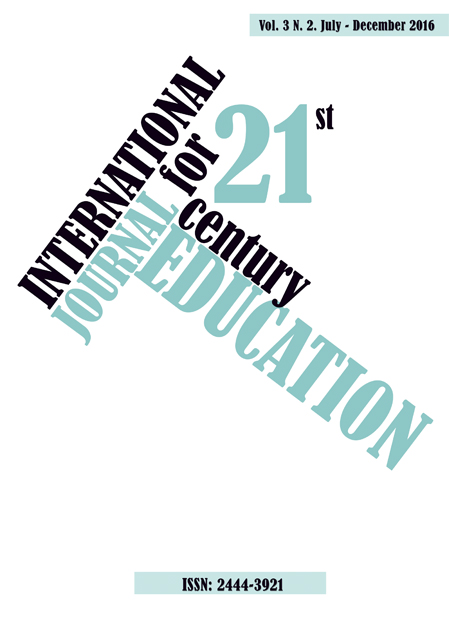Promoting Student Engagement Through Outcomes-based Education in an EAL Environment
Contenido principal del artículo
Resumen
Descargas
Detalles del artículo
Bibliografía
- Anaya, G. (1999). College Impact on Student Learning: Comparing the Use of Self-Reported Gains, Standardized Test Scores and College Grades. Research in Higher Education. 40 (5), pp 499–526
- Anderson, W. and Krathwohl, D. R. (2000). A taxonomy for learning, teaching and assessment: A revision of Bloom’s taxonomy of educational objectives. White Plains, NY: Longman
- Anderson, L.W. (Ed.), Krathwohl, D.R. (Ed.), (2001). A taxonomy for learning, teaching, and assessing: A revision of Bloom’s Taxonomy of Educational Objectives (Complete edition). New York: Longman.
- Bean, J. P (2005) Nine Themes of College Student Retention. In Seidman, A (Ed) College Student Retention: Formula for Student Success, Washington DC: ACE & Praeger, pp 215–244
- Beckett, G. H., & Miller, P. C. (2006). Project-based second and foreign language education: Past, present, and future. IAP.
- Berlach, R. G. (2004). Outcomes-based education and the death of knowledge. Paper presented at The Australian Association for Research in Education Conference, The University of Melbourne, Victoria, Australia. Nov 28 – Dec 2, 2004. Available: http://asopa.typepad.com/files/obe-the-death-of-knowledge.pdf
- Beichner, R., Deardorff, D., & Zhang, B. (1999). GOAL-oriented Problem Solving. Available: http://ncsu.edu/PER/Problem%20SolvingF04.pdf
- Bloom, B. S. (1956). Taxonomy of educational objectives. 1. Cognitive domain. New York: David McKay.
- Bransford, J., Brown, A., & Cocking, R. (2000). How people learn: Brain, mind, experience, and school. Washington, DC: National Academy Press.
- Chau, J. & Cheng, G. (2010) Towards understanding the potential of e-portfolios for independent learning: A qualitative study. Australasian Journal of Educational Technology. 26(7): 932-950. Available: http://www.ascilite.org.au/ajet/ajet26/chau.html
- Chickering, A. W., & Gamson,Z. F. (1987). Seven principles for good practice in undergraduate education. AAHE bulletin, 3, 7. Available: http://files.eric.ed.gov/fulltext/ED282491.pdf
- Christenson, S.L., Reschly, A. L., Wylie, C. (Eds.). 2012. Handbook of research on student engagement. New York: Springer Science + Business Media.
- Council of Europe (2002), Seminar on Recognition Issues in the Bologna Process, Lisbon, April 2002.Available: http://www.coe.int
- Coyle, D. 2007. Content and language integrated learning: Towards a connected research agenda for CLIL pedagogies. The International Journal of Bilingual Education and Bilingualism 10, no. 5:543 62.
- Coyle, D. Hood, P. & Marsh, D. (2010). Content and language integrated learning. Cambridge: Cambridge University Press
- Cross, K.P. (1992) Classroom assessment/classroom research: Four years into a hands-on movement. The National Teaching and Learning Forum, 1 (6), 1-3
- Dalton-Puffer, C. (2007). Discourse in content and language integrated learning (CLIL) classrooms. Philadelphia, PA: John Benjamins
- Fink, L.D. (2003). Creating significant learning experiences: An integrated approach to designing college courses. San Francisco: Jossey-Bass.
- Generation Z Available: http://generationz.com.au/
- Geyer, F. (2001) Sociology of alienation. In International encyclopedia of the social and behavioural sciences, ed. N.J. Smelser and P.B. Baltes, 388 -92. Oxford: Pergamo
- Harper, S. R., & Quaye, S. J. (2009). Beyond sameness, with engagement and outcomes
for all: An introduction. In S. R. Harper & S. J. Quaye (Eds.), Student engagement in
higher education: Theoretical perspectives and practical approaches for diverse
- populations (pp. 1-15). New York, NY: Routledge.
- Harper, S. R., & Quaye, S. J. (Eds.) (2014). Student Engagement in Higher Education: Theoretical Perspectives and Practical Approaches for Diverse Populations. Revised Edition. Routledge, 2014
- Hejazi, B. M. (2011). Outcomes-Based Education (OBE): A Transformational Perspective on Quality and Mobility in Higher Education. http://siddha.jfn.ac.lk/OBESCL/MOHE/OBE-Articles/Books-chapters-n-Reports/3.OBE-Transformational-Perspective.pdf
- Hénard, F. (2010), Learning Our Lesson: Review of Quality Teaching in Higher Education, OECD Publishing, Paris. Available: http://dx.doi.org/10.1787/9789264079281-en.
- Jenkins, A. & Unwin, D. (2001). How to write learning outcomes. Available: www.ncgia.ucsb.edu/education/curricula/giscc/units/format/outcomes.html
- Jimerson, S. R., Campos, E., and Greif, J. L. (2003). Toward an understanding of definitions and measures of school engagement and related terms. California School Psychologist, 8, 7 – 27. Available: http://ed-psych.utah.edu/school-psych/_documents/grants/autism-training-grant/CSP2003.pdf#page=9
- Kinkead, J. (2003). Learning through inquiry: An overview of undergraduate research. New Directions for Teaching & Learning. Issue 93. Available: https://web.b.ebscohost.com/ehost/pdfviewer/pdfviewer?sid=d176d7e0-99ee-4ccb-8f47-ffa81271ad05%40sessionmgr114&vid=3&hid=121
- Krathwohl, D. R. (2002). A Revision of Bloom's Taxonomy: An Overview. Theory into Practice, 41(4), 212. Available: https://search.ebscohost.com/login.aspx?direct=true&db=tfh&AN=8550701&site=ehost-live&scope=site
- Kuh, G.D. (2001). The national survey of student engagement: Conceptual framework and overview of psychometric properties. Bloomington, IN: Indiana University Center for Postsecondary Research & Planning. Available: http://nsse.indiana.edu/2004_annual_report/pdf/2004_Conceptual_Framework.pdf
- Lasagabaster, D. (2011). English achievement and student motivation in CLIL and EFL. Innovation in Language Learning and Teaching, 5(1), 3- 18. Available: http://www.laslab.org/upload/english_achievement_and_student_motivation_in_clil_and_efl_settings.pdf
- Malan, S.P.T. (2000). The 'new paradigm' of outcomes-based education in perspective. Tydskrif vir Gesinsekologie en Verbruikerswetenskappe, Vol 28, 22-28. Available: http://www.ajol.info/index.php/jfecs/article/viewFile/52788/41390
- Marriam, S. B., and Caffarella, R. S. (1991) Learning in Adulthood. San Francisco: Jossey-Bass.
- Nilson, L. B. (2010). Teaching at its best: A research-based resource for college instructors. John Wiley & Sons
- Organization for Economic Cooperation and Development (OECD). (2004) Knowledge economy: Implications for knowledge and learning. Available: http://www.oecd.org/LongAbstract/0,3425,en_2649_39263294_31658285_1_1_1_1,00.html.
- Purser, L. (2003). Recognition issues in the Bologna Process: conclusions and recommendations. In S. Bergan (Ed.), Recognition issues in the Bologna Process. Council of Europe. Available: https://books.google.ae/books?lr=&id=qL0wjo33QcIC&dq=L+Purser++Recognition+Issues+in+the+Bologna+Process&q
- Tross, S. A., Harper, J. P., Osherr, L.W., and Kneidinger, L. M (2000). Not just the usual cast of characteristics: Using personality to predict college performance and retention. Journal of College Student Development. 41 (3), pp 325–336
- Zhan, W. (2014) Research experience for undergraduate students and its impact on STEM education. Journal of STEM Education: Innovations & Research. 15(1): 32-38. Available: https://search.ebscohost.com/login.aspx?direct=true&db=a9h&AN=96381828&site=ehost-live&scope=site

